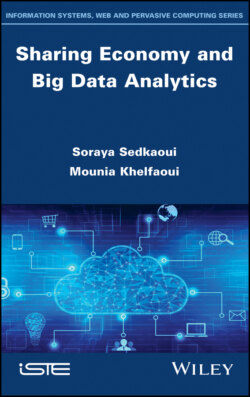Читать книгу Sharing Economy and Big Data Analytics - Soraya Sedkaoui - Страница 33
Box 1.4. The service economy (ADEME 2017)
Оглавление“The service economy, sometimes also called the ‘performance economy’, is a concept that was developed by Walter Stahel in the 1980s and was taken over by Dominique Bourg in the 2000s.”
It was approached by two theoretical schools. The Anglo-Saxon School, whose thought processes are based on the Product Service System (PSS) model. The main contributors to this school are Walter Stahel, Buclet, Okasana. The second school is the École française de l'économie de la fonctionnalité et de la coopération (French school of service economy and cooperation or EFC), whose ideas are mainly supported by Christophe Sempels and Christian Du Terre (Chaput 2015).
Stahel (2006) testifies that:
The service economy, which aims to optimize the use – or function – of goods and services, focuses on the management of existing wealth, in the form of products, knowledge or natural capital. The economic objective is to create the highest possible usage value for as long as possible, while consuming the least amount of material resources and energy possible. The aim is to achieve greater competitiveness and an increase in corporate income. (Van Neil 2007)
It is also defined by ADEME (Agence de l'environnement et de la maîtrise de l'énergie – Agency of the environment and the control of energy) as the economy which “consists of providing companies, individuals or territories with integrated solutions for services and goods based on the sale of a performance of usage or a usage and not on the sale of goods alone. These solutions must allow a lower consumption of natural resources in a circular economy perspective, an increase in people’s well-being and economic development”.
The basic idea of this concept involves the new view of the economic value of goods. While the traditional approach to economic and measurable character considers its cost, supply and demand, the contemporary approach, inspired by the principles of sustainable development, considers that economic value practically doesn’t include the damage inflicted on the environment by the production and over-consumption of this good. Therefore, in the absence of integrating negative externalities (of the production and use of the good), the value of the good no longer concerns its appropriation, but rather its use.
The service economy is a new business model, as it reorganizes the relationship between the market, the company and the consumer. Indeed, since the advent of industrialization, the focus of economic activity has been on large scale production and consumption. The objective of this economic situation was to produce more in order to satisfy consumption while constantly changing goods and services:
For a company, the growth of its markets goes hand in hand with the increase in number of units produced, related to the acceleration of the redundancy of its products. This redundancy is frequently ‘programmed’, either by influencing the material lifetime of products designed to no longer be repairable, or by stimulating consumers to equip themselves with the latest innovations, few of which constitute radical innovations responding to new needs and/or uses. (Buclet 2005)
However, the era of industrialization is no longer the representative of dream of the Trente Glorieuses, the 30-year period following the end of World War Two. According to Fordist doctrine, mass production for mass consumption is no longer perceived as an advantage for the well-being of people:
For many economists (Gadrey in 2002, Gadrey and Zarifian in 2002, Du Tertre in 2008 and 2009), overcoming the Fordist crisis implies the implementation of a new form of economic organization based on a service-oriented dynamic approach that they must present as a central phenomenon in current economic and societal developments. The idea would no longer be to buy the good you need, but to rent the service provided by its consumption. (Vaileanu-Paun and Boutillier 2012)
The principle of this new model is to change the relationship between the company and the consumer. This does not mean that the objectives of the company or the consumer have changed. Consumers are always looking to satisfy their well-being by considering the new situation (economic crisis, ecological crisis, etc.). The company also thinks about its profitability interest by remaining the owner of the assets and selling their uses (Buclet 2005).
Practices in the context of this logic are adopted by several well-known companies around the world: Michelin, Xerox, Amazon, Apple, Microsoft and many others.
